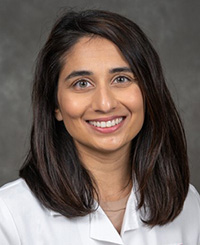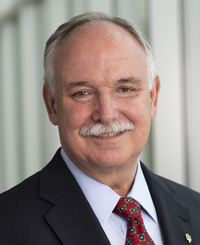March 1, 2020:
Investigator Spotlight
Anita Turk, MD, Indiana University School of Medicine
Educational background
- MD: Indiana University School of Medicine
- Residency: University of Chicago
- Fellowship: University of Wisconsin
Research interests
I am a medical oncologist who treats gastrointestinal malignancies with a special focus on hepatobiliary cancers. My research focus is to develop targeted and immune-based therapies for my patients. Through Indiana University’s Precision Genomics Clinic, we have been able to sequence tumors to help us understand the biology and identify the best clinical trials within the Big Ten CRC for our patients.
Little-known facts about Dr. Turk
- I’ve worked at two Big Ten CRC institutions, Indiana University and University of Wisconsin.
- I love to travel with my husband at least twice a year.
- I enjoy spending time outdoors whenever I can.
Patrick J. Loehrer, Sr., MD, Indiana University Distinguished Professor; Associate Dean for Cancer Research; Director, Indiana University Melvin and Bren Simon Comprehensive Cancer Center; H.H. Gregg Professor of Oncology; Professor of Medicine, Indiana University School of Medicine
 Four decades ago, when I came to Indianapolis from Chicago for an elective during my fourth year of medical school, I witnessed a miracle of medical science. A then-young assistant professor named Larry Einhorn had conceived a combination of drugs that melted away metastatic testicular cancer, which was the biggest cause of cancer deaths for young men. Larry worked with Drs. John Donohue and Ken Kesler to change the paradigm of oncology by making what seemed impossible possible – curing a cancer.
Four decades ago, when I came to Indianapolis from Chicago for an elective during my fourth year of medical school, I witnessed a miracle of medical science. A then-young assistant professor named Larry Einhorn had conceived a combination of drugs that melted away metastatic testicular cancer, which was the biggest cause of cancer deaths for young men. Larry worked with Drs. John Donohue and Ken Kesler to change the paradigm of oncology by making what seemed impossible possible – curing a cancer.
Stephen Williams, a fellow at that time, would later do the same for ovarian germ cell tumors. He would become the founding director of the then-Indiana University Cancer Center and lead it to earning in 1999 the prestigious National Cancer Institute designation — a designation that recognized the center’s outstanding research.
Over the next 20 years, we’d demonstrate to the NCI — the nation’s top cancer agency — that our research continued to meet its rigorous criteria, allowing us to repeatedly earn the designation that put us in the elite company of the nation’s best cancer centers. In 2006, our center’s name changed to the Indiana University Melvin and Bren Simon Cancer Center to reflect a generous $50 million gift made by the late Melvin Simon and his wife, Bren. In 2010, I succeeded my friend and colleague Stephen Williams as cancer center director following his death from melanoma.
Most recently, we paused in August 2019 to celebrate a milestone: We earned the NCI’s Comprehensive Cancer Center designation. The designation recognizes the center’s added depth and breadth in basic, clinical, and population research, as well as its effective community outreach program across the state.
The comprehensive designation places us in the company of only 51 other cancer centers nationwide, including the University of Texas MD Anderson Cancer Center, Dana-Farber/Harvard Cancer Center, Memorial Sloan-Kettering Cancer Center, and Sidney Kimmel Comprehensive Cancer Center at Johns Hopkins. Previously, no other cancer center in the Midwest had earned this top designation since it was awarded to the University of Chicago more than a decade ago.
Most importantly, the discoveries made in our labs will continue to move into the patient setting to improve lives. This “bench-to-bedside” approach benefits patients as researchers and physicians work together to find better ways to prevent, diagnose, and treat cancer. Another benefit for patients is that we offer clinical trials that are only available at the nation’s leading cancer centers.
Plus, patients benefit from the work of brilliant and talented IU physician-scientists who have changed the field of oncology. These men and women have altered or defined treatment standards for:
- breast cancer
- gastrointestinal cancer, including pancreatic and colon cancers
- genitourinary cancer, such as testis, bladder and prostate cancers
- hematologic disorders, including multiple myeloma and leukemia
- thoracic cancer
- thymoma and thymic carcinoma
- tumors associated with neurofibromatosis type 1, primarily in children
- umbilical stem cell transplantation
The center’s physicians care for patients through a partnership with Indiana University Health, the state’s largest health system, and through the Sidney & Lois Eskenazi Hospital and the Richard L. Roudebush VA Medical Center, both in downtown Indianapolis.
Outside of the clinical setting, the center’s researchers partner with organizations to improve the health of all Hoosiers. The collaborative work focuses on reducing the number of new cancer cases and the number of deaths caused by the disease. This also includes initiatives to increase HPV vaccination rates as well as developing, testing, and disseminating interventions to increase breast, cervical and colorectal cancer screening, especially in racially diverse and rural populations in Indiana. Much of that work is grounded in behavioral oncology research under the pioneering leadership of Dr. Victoria Champion.
Our researchers and physicians — which number nearly 250 strong and represent multiple IU Schools including Medicine; Nursing; Public Health; Engineering and Technology; Informatics, Computing, and Engineering; and more — continue to follow in the footsteps of the likes of Einhorn, Williams, Champion, and others. Each is dedicated to decreasing the burden of cancer for our patients in Indiana and beyond.
About the Big Ten Cancer Research Consortium: The Big Ten Cancer Research Consortium was created in 2013 to transform the conduct of cancer research through collaborative, hypothesis-driven, highly translational oncology trials that leverage the scientific and clinical expertise of Big Ten universities. The goal of the Big Ten Cancer Research Consortium is to create a unique team-research culture to drive science rapidly from ideas to new approaches to cancer treatment. Within this innovative environment, today’s research leaders collaborate with and mentor the research leaders of tomorrow with the unified goal of improving the lives of all patients with cancer.
About the Big Ten Conference: The Big Ten Conference is an association of world-class universities whose member institutions share a common mission of research, graduate, professional and undergraduate teaching and public service. Founded in 1896, the Big Ten has sustained a comprehensive set of shared practices and policies that enforce the priority of academics in the lives of students competing in intercollegiate athletics and emphasize the values of integrity, fairness and competitiveness. The broad-based programs of the 14 Big Ten institutions will provide over $200 million in direct financial support to more than 9,800 students for more than 11,000 participation opportunities on 350 teams in 42 different sports. The Big Ten sponsors 28 official conference sports, 14 for men and 14 for women, including the addition of men’s ice hockey and men’s and women’s lacrosse since 2013. For more information, visit www.bigten.org.














Subscribe to the Big Ten CRC Newsletter X
X Facebook
Facebook YouTube
YouTube